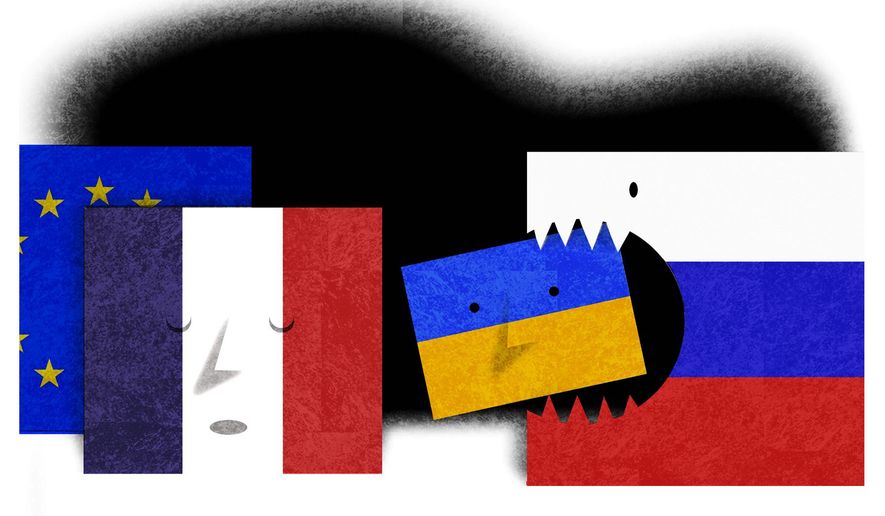OPINION:
“Europe must negotiate with Russia!” declared French President Emmanuel Macron in Brussels this week. The European Union shut out of talks with the U.S. and NATO over the growing crisis in Ukraine, has no army of its own and has no means of defending Ukraine, a country it claims as an ally. So why should it be at the table?
France, on the other hand, is different. Britain may have the largest military on the other side of the Atlantic, but now after Brexit, and with the German army so dilapidated it’s been training with broomsticks in place of rifles, France is the only country with any substantial capacity on the continental European mainland: Nuclear weapons, a U.N. Security Council permanent seat, an aircraft carrier and 100,000 troops — France is Europe when it comes to defense and diplomacy.
But that’s not how Mr. Macron of France sees it. And it doesn’t help the U.S. one bit. Instead of leveraging its outsized role to benefit Europe by leading from the front, Mr. Macron is determined to drag all other 26 EU members — along with their superannuated Brussels bureaucrats — as baggage, kicking and screaming, to the table for an entirely separate meeting with the Russians – without the Americans or British present. To negotiate what, precisely, is not clear.
But clarity is not what America has been hearing from France for a long time. Take the Caucasus, where France is one of three permanent co-chairs of the OSCE “Minsk Group.” Tasked with negotiating peace between Armenia and Azerbaijan, the French have been missing in action. Since a nasty war between those Caucasian neighbors in late 2020, the other two chairs — Russia and the U.S. — facilitated their own separate ceasefire and peace initiatives in Moscow and Washington. But France? Nothing. Instead, that task was deferred to the EU, who, despite having no seat of their own at the table, hosted peace talks between the Azerbaijani president and Armenian prime minister in December.
Mr. Macron is not alone in his belief that Europeanizing France’s foreign policy makes her stronger everywhere, including in the face of Russian aggression. How to square that with the Germans, who are so addicted to Russian gas they helped build a pipeline bypassing all their European neighbors, as well as Latvia, Malta, Luxembourg and Cyprus — whose entire economies are banks for dubious Russian money — is not obvious. All these highly compromised countries will be amongst those sitting at the table alongside France, negotiating from “collective European strength” with Russian President Vladimir Putin. Good luck with that.
Yet this impossible answer of “More Europe!” to any and every question is maintained by the entirety of the French elite. To suggest a top-six global economy and nuclear-armed power should act for itself would seem obvious to most in the world today: To think so in France puts you on the lunatic fringe of Parisian politics.
Unsurprisingly, lacking any direction, debate or say over matters of international power and diplomacy, national politics folds into the parochial — with nasty consequences. Chasing half a million Armenian Diaspora votes in France — which in a tight election could make the difference between victory and defeat — has become a national political pastime. Mr. Macron won them last election. In this year’s presidential contest, his opponent of the mainstream right, Valerie Pecresse, can smell they are up for grabs. Damn the consequences, and damn diplomacy is her approach: Fishing for votes, she visited territory legally part of Azerbaijan but still under post-war illegal occupation by Armenia for a photo op to profess her support for “Armenians and Christians everywhere!” — whatever that means.
Unsurprisingly the Azerbaijani authorities, incensed, banned her from entering their country for life. If polling is correct, France — a supposedly neutral co-chair of the Minsk Group — could soon be led by a woman who is blacklisted from one of the two countries for whom the group was established to facilitate peace. From Mr. Macron’s inertia to Ms. Pecresse’s push for votes, Didier Billion, deputy director at the Paris-based Institute for International and Strategic Affairs, is correct that France’s political leaders have so blatantly been “taking up the cause” for Armenia that France now finds itself “out of the game.”
It’s clear there are very serious consequences when a country such as France purposefully negates the power and responsibility she possesses. Indeed, France risks trivializing her influence through association with deeply compromised, supposed European allies. It makes the world less safe and, shorn of any serious foreign policy engagement or understanding, it can easily lead her politicians to make unforced errors in matters of war and peace. Put simply, Europe needs France — not the other way around.
But right now, France is AWOL. America and NATO need France to step up, unencumbered by the millstones that are the other EU member states. Will she? Can she? What’s certain is that with friends like today’s France, one doesn’t need enemies.
• Professor Ivan Sascha Sheehan is the executive director of the School of Public and International Affairs at the University of Baltimore. Opinions expressed are his own. Follow him on Twitter @ProfSheehan




Please read our comment policy before commenting.